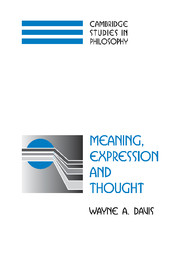Book contents
23 - Incompleteness Objections
Published online by Cambridge University Press: 20 July 2009
Summary
We argued in the previous chapter that ideational theories of meaning are neither regressive nor circular. Ideas are logically and epistemologically independent of words. And the intentional content of ideas is a radically different sort of property than the meaning of words. Many have charged that if this is true, then ideational theories of meaning are incomplete. The objection is that ideational theories cannot provide a satisfactory explanation of what it is for a word to have a meaning without explaining what it is to have an idea, or what it is for an idea to be of something. Ideational theories of meaning are also thought to be incomplete because they ignore language-world relations, that is, reference. We will conclude our defense of the expression theory by responding to these objections.
UNDEFINED TERMS
We have defined meaning as the expression of ideas and other mental states. We have defined the term “expression” for both speakers and words. Speaker expression was defined in terms of intention and evidential meaning. Word expression was defined in terms of speaker expression and convention. We have defined ideas in terms of thoughts. An idea, we have said, is a thought or a cognitive thought-part (Definition 15.1). We think a thought, or conceive an idea, when it occurs to us. We spent several chapters clarifying the term “thought” to make sure that it was clearly understood, and that we know what it denotes. We all know introspectively what it is to think.
- Type
- Chapter
- Information
- Meaning, Expression and Thought , pp. 599 - 607Publisher: Cambridge University PressPrint publication year: 2002



